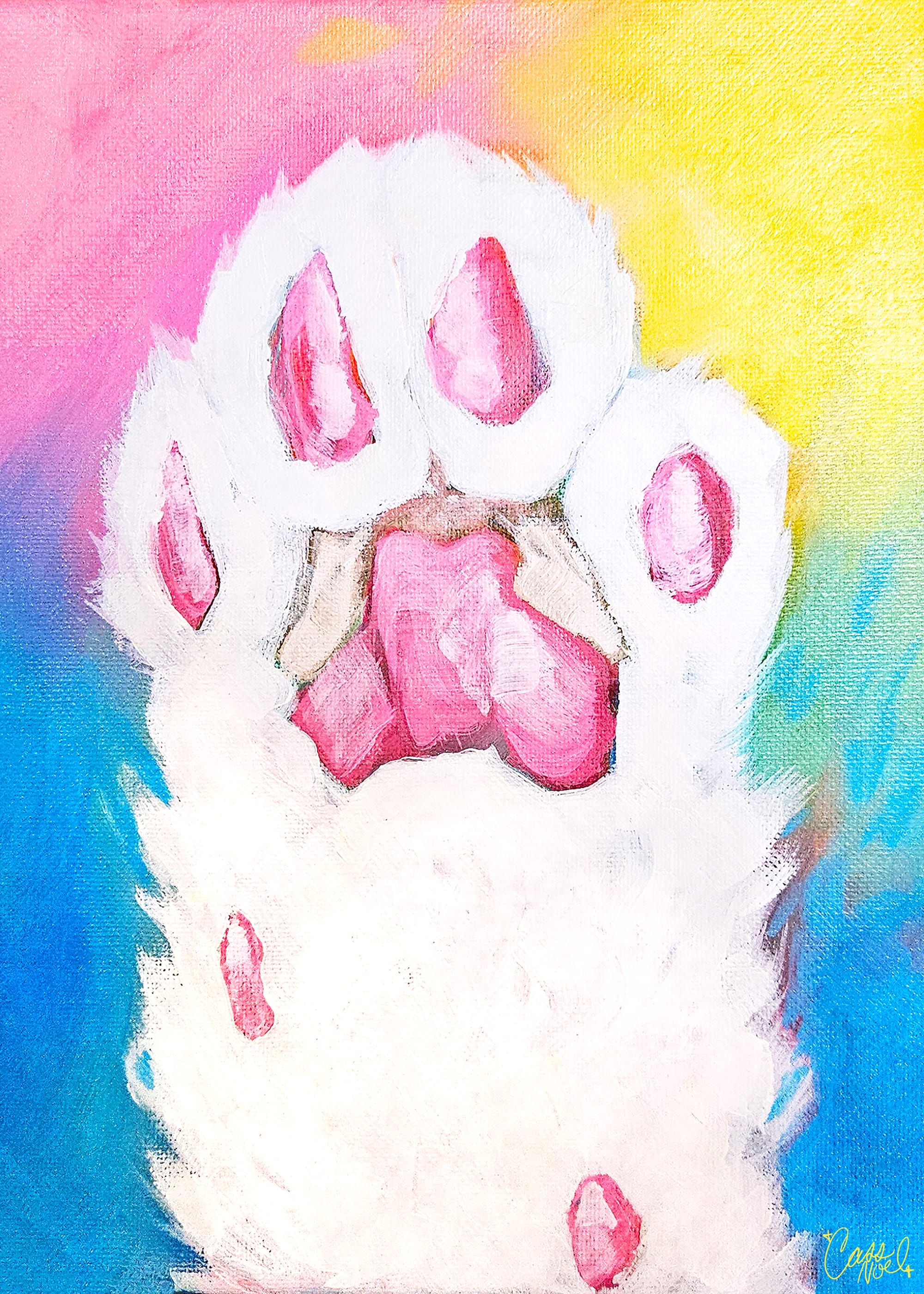Love and Fairness / Lynn Partym / Partym is pronounced part-ihm, follow me for more art or commission on instagram @metalfaerywings and on twitter @lynnxdotcom
BALLOONS
Strings wrapped around her hand,
She is determined to hold the unruly balloons
Winds toss and tug,
Teasing the strings.
She must hold on; they must stay together.
The balloons travel with her.
Crowds jostle,
Some balloons burst,
Her fingers grip,
And she trudges on, considering the day.
Remembers appointments,
Accepts obligations,
Dismisses pleasures.
Her fingers cramp and strings slip.
A gust, a bump,
In every direction,
She flies away.
-SueEllen Davis
June 5, 2024

Cassandra Mehlenbacher is a whimsical animal artist and surface pattern designer. IG: cass_noel_studio
Introduce Yourself
Get to know your neighbors,
both human and non-human.
Stop and chat
with that person you see working
in their front yard across the street.
Slow down and watch
what the ants are carrying
into their nest.
Introduce yourself
to that fuzzy little flower
that grows through the sidewalk crack.
You can learn
the non-humans’ names
by spending some time with them,
along with books, websites,
and your local museum.
Once you know someone’s name
you are more likely to care about them
and do what it takes to protect them.
They are already doing something for you.
You are not alone.
—Pauline Schafer
Education Manager, REACH Museum

Frozen Rose
Just like a picture perfect portrait, there you stood frozen in time.
Your beauty so still, yet so vibrant, not even the strong wind could push you down.
As I held you close, I felt you begin to once again emerge.
Ready to break free. But you were stuck in a vice of ice.
Soon, the sun came up. As the cold ice melted slowly, trickling down your velvet body,
i contemplated "TIME" and all the beauty of each season.
What a gift. Yes, it was winter, but there you were, fully in bloom, pretty in pink, underneath mother nature's coat of ice.
For sure, your beauty was specifically for me to see, and it was meant for us to cross paths.
Frozen Rose: though seasons change, your beauty remains frozen in time. A masterpiece imprinted in time and in the mind forevermore.
—Alicia Barrera
Fall
in
I’m words
El mundo ya no es digno de la palabra (The world is no longer worthy of the word)
desgrama (unspelled)
violencia (violence)
comas sin pausa (commas without pause)
(espacio interior) ((internal space))
se encuentra la palabra (the word finds)
así misma (itself)
rodeada de espejos que le muestran (surrounded by mirrors that show)
escenarios apocalípticos (apocalyptical scenarios)
paisajes (landscapes that are)
t t
r r
a a
n n
s s
h h
u u
m m
a a
n n
o
s
y se rinde en silencio (and it surrenders in silence)
y se queda sin signo (and remains without a sign)
sus manos sin boca (its hands with no mouth)
su boca son puños (its mouth is fists)
y aparece la queja: (and the complaint emerges)
plomo (lead)
sequía (drought)
anhelo de verbo (the craving of verbs)
y muchos puntos finales (and endless periods)
(espacio exterior) ((exterior space))
abrir la boca (to open the mouth)
decir nada (saying nothing)
palabrería: (wordiness)
<<anhelo de otros>> (<< longing for others >>)
adornos trasnochados (outdated ornaments)
narcisismo matutino (early morning narcissism)
una hoja en blanco (a blank page)
una voz pequeña que dice nubes y vuela (a little voice speaking of clouds and flights)
elocuencia viral (viral eloquence)
y alguna vez, con suerte (and sometimes, with luck)
algún paréntesis sin contenido delicado (some parenthesis without fragile content)
¿cómo hacer (how does one)
nacer un acontecimiento (give birth to an event)
en medio de este (in the middle of this)
mar acontecimental? (sea of affairs)
grama (grama)
resurrección al léxico (lexical resurrection)
romantizar lo fútil, quizá (perhaps to romanticize the futile)
un día viendo como cae una mariposa a las 6pm (one day observing how a butterfly falls at 6pm)
un día con hambre (one day with hunger)
un día con sed (one day with thirst)
un día sin refugio (one day without shelter)
un día muriendo ante los ojos del mundo (a day dying in front of the eyes of the world)
un día estoico y solo para decirme lo patético de mi existencia (one stoic day, just to show me how pathetic my life is)
lo común de mi nombre (how common my name is)
¿cuántas palabras son necesarias para detener una guerra? (how many words will it take to stop a war?)
¿cuánta poesía para cambiar al mundo? (how much poetry will it take to change the world?)
inverbe (wordless)
desecho morfosintético (morphosyntactic waste)
¿qué nos queda de la palabra? (what is left of the word?)
el lenguaje de guerra (the language of war)
y escribo (and i write)
(soñé que escribir era un trabajo digno ((i dreamed that writing was dignified work)
o un posible futuro) (or a possible future))
no lo es (it is not)
y (and)
caigo de palabras (I fall into words)
de callar en cada fraseo (of silence in every phrase)
y (and)
sigo (i keep going)
parafraseo como resistiendome a algo (paraphrasing like i’m resisting something)
presente (present)
del deseo de latido (of the desire for a heartbeat)
del acontecimiento consciente (of the conscious event)
¿para qué, entonces, los verbos? (so why, then, the verbs?)
si mueren de inacción (if they die of inaction)
en ráfagas de movimientos (in bursts of movement)
si permanecen sentados (if they remain seated)
en marchas infinitas (in infinite marches)
si miran las bombas (if they look at the bombs)
sin tácito acento ni signos exclamativos (without tacit accent or exclamation marks)
si muero (if i die)
y la gente dice “tendencia” (and people say “trending”)
si las comas se quedan sin pausa (if commas lose their pause)
y los puntos, siempre son puntos seguidos (and dots are always ellipses, not periods)
(espacio interior) ((internal space))
el terror (the terror)
la palabra y el mundo. (the word and the world.)
— Mariana Rossier
Nota del traductor: Que bello poema, lo ame, lo ame tanto que le puse toda la dedicación del mundo para no solo traducirlo si no para poder con la traducción transmitir ese sentimiento que la escritora y su energía habitan en las letras.
Translator's note: What a beautiful poem. I loved it. I loved it so much that I put all the dedication in the world into not only translating it but also being able to transmit that feeling that the writer and her energy inhabit in the letters.
— Ulises Navarro
Mariana Rossier es una poeta y artista interdisciplinaria, interesada en el impacto del arte en la sociedad, el trabajo comunitario, la cartografía narrativa y la liminalidad en la literatura.
Ella explora la relación entre lo íntimo, la memoria y el lenguaje. A través de la poesía, la performance y la música desarrolla dispositivos escénicos y textos transmediales. En su investigación como poeta ha desarrollado un laboratorio de escrituras experimentales bajo el concepto de Poesía Documental, apoyado en la metodología Cartografía Narrativa, del cual imparte el taller a nivel nacional desde 2020.
Además de coordinar el Laboratorio Continuo de Performance y las Noches de Performance en la CDMX. Ha publicado en revistas impresas como: Revista Generación, Transe Magazine, Escritoras Mexicanas, Poe-tripiados, Revista Hysteria, Revista Anestesia, Revista Primera Página, y Revista de Arte Boticario, entre otras. Es parte de la antología “Inefables” de la editorial Asparagus Editorial en Baja California.
Mariana Rossier is a poet and interdisciplinary artist, interested in the impact of art on society, community work, narrative cartography and liminality in literature.
She explores the relationship between intimacy, memory and language. Through poetry, performance, and music, she develops stage devices and transmedia texts. In her research as a poet, she has developed a laboratory of experimental writings under the concept of Documentary Poetry, supported by the Narrative Cartography methodology, for which she has taught a workshop nationwide since 2020.
In addition to coordinating the Laboratorio Continuo de Performance (Continuous Performance Laboratory) and the Noches de Performance (Performance Nights) in Mexico City, she has published in print magazines such as Revista Generación, Transe Magazine, Escritoras Mexicanas, Poe-tripiados, Revista Hysteria, Revista Anestesia, Revista Primera Página, and Revista de Arte Boticario, among others. She is part of the anthology Inefables by the Asparagus Editorial publishing house in Baja, California.
DESARRAIGADO (ROOTLESS)
La raíz busca tierra, The root reaches for the earth
mientras la fronda viento. While wind blows its foliage El hambre empuja Hunger pushes
mientras los sueños jalan. while dreams pull.
Voy rumbo norte I head to the north
a cosechar promesas To harvest promises
que sembré allá en el sur. That I sowed in the south. En mi tierra reseca In my parched land
solo crecen raíces. Only roots grow.
Dicen que el agua They say that water
siempre vuelve a su cauce always gets back to its riverbed
y espero que sea así: and I hope that is the case:
Me arrancó la corriente. The current took me away.
— José Carlos Osorno Covarrubias
Poemario: Aquí No Pasa Nada
Obeidah the Cow
We had a cow, Obeidah the cow.
She had big wide eyes
but the whole herd had big wide eyes.
She was dappled
but the rest of them were dappled.
She had two large udders
that daily gave two or three buckets of milk
but every other cow in the herd had full udders
my mom milked for the same amount.
Most of the time Obeidah had snot running down her nose
and that was disgusting
and pervasive in the herd we owned,
their nostrils were snot-filled.
And whenever we took her calf away from under her
Obeidah used to shed tears like human tears
and that was the case for the rest of the cows
whenever we took their calves away from them
they cried like humans might.
Obeidah used to suffer longing.
And would low a painful moo.
The whole herd could do this
and rip our heart cords apart, send us
into hiding under blankets
as if taking cover
from a night monster until daybreak.
At daybreak we’d declare our safe presence
by taking a piss out in the open
one after the other
a natural rite of passage
as the sun recited her hymns overhead.
Then into the plains we, kids, would go
unafraid of being lost
where we’d been in a previous life.
We knew even the smallest rocks,
the yellow snakes, their crossing time,
and in our mouths
we held a piece of bread each,
and in each hand a thin stick
off the corpse of the poppy plant
we used to call the bitter orange bush.
We would run brandishing our sticks
with Obeidah and the entire herd ahead of us
and alongside them
our dog, Camel.
—Ahlam Bsharat, Jiftlik
Translated by Fady Joudah.
Read more at: thebaffler.com/logical-revolts/poems-from-palestine


